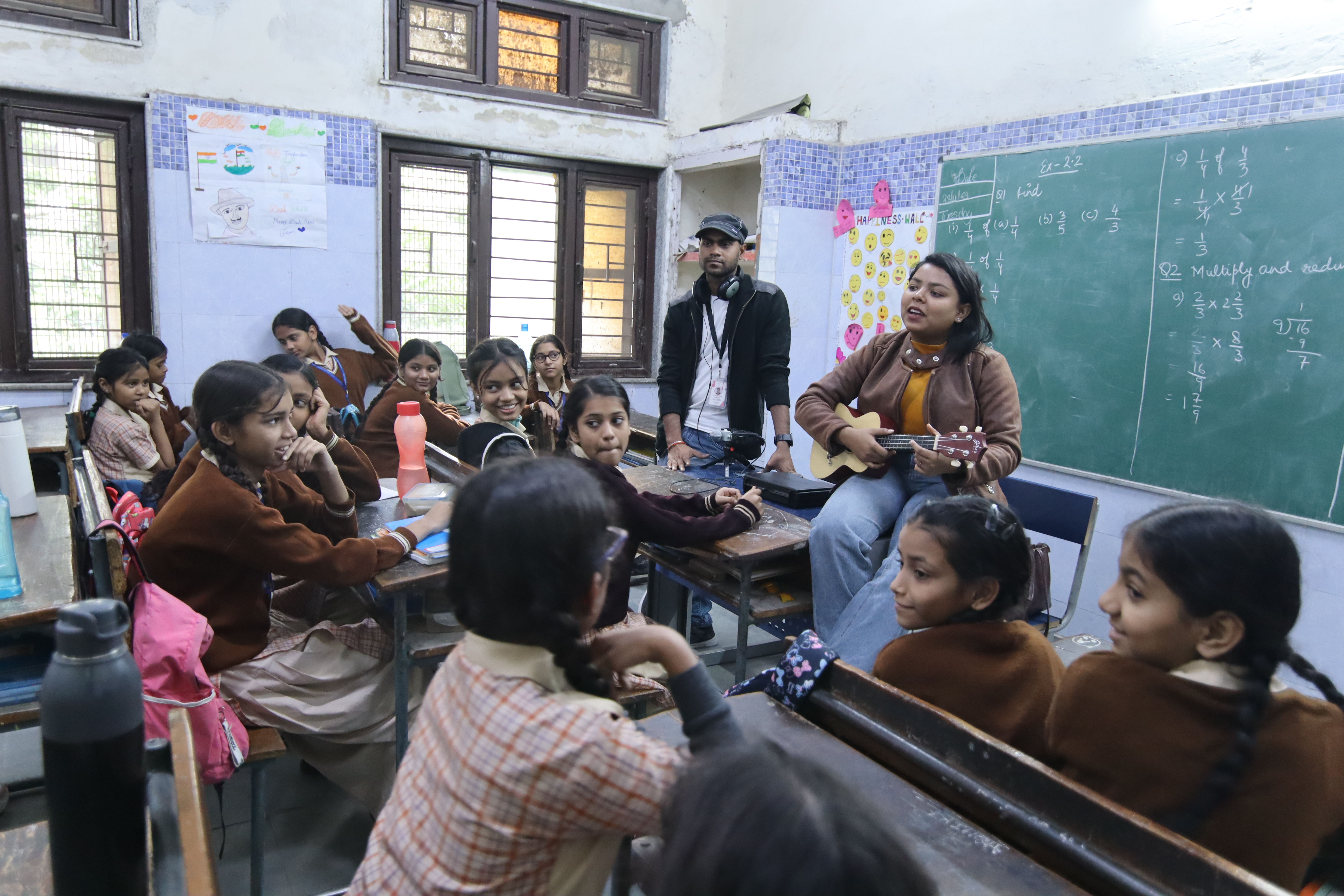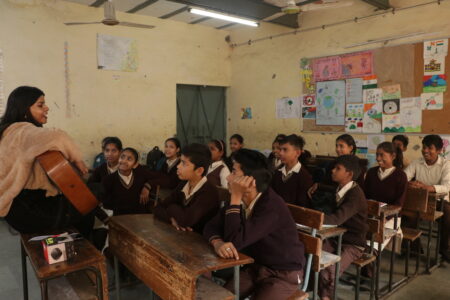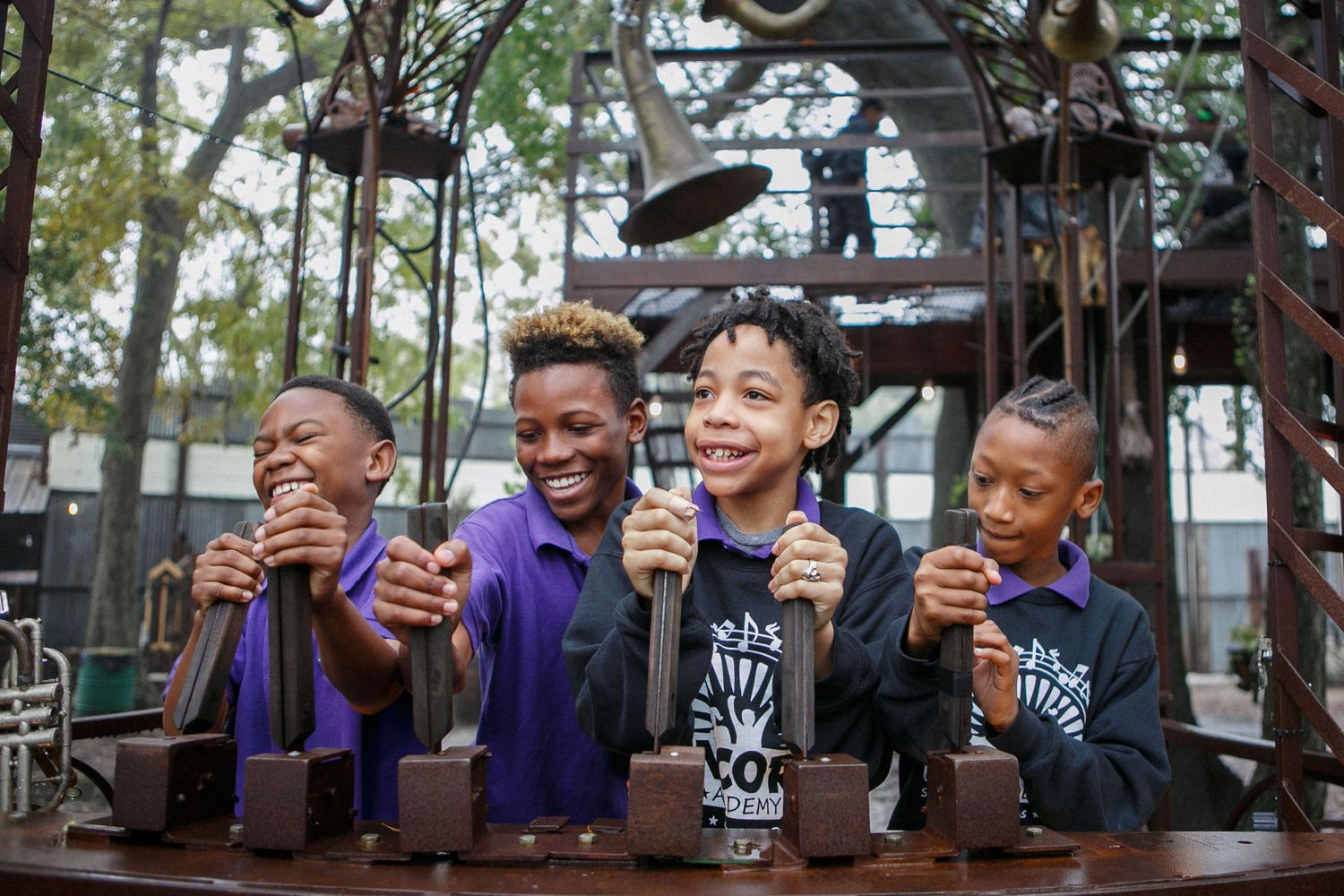
At Manzil Mystics, Ancient Language Offers Timeless Truth

Sheetal (Fellow) conducting a learning through music session with 6th-grade students of a public school in Delhi.
There are not many music programs in the world with the word “Mystics” in their name. But it serves us well. Like many Ensemble readers, we are a passionate group of musicians working toward creating social inclusion and happy childhoods through music. And we find inspiration in the all-inclusive and peaceful messages of mystic poets like Kabir Das and Mahatma Gandhi.
Our core values…
…are rooted in the ancient language of Sanskrit. ‘Satsang’ (सत्संग) merges ‘sat,’ meaning ‘truth,’ and ‘sangha,’ meaning ‘community.’ We create spaces where everyone can connect with truth through singing meaningful songs together. Samvaad (संवाद) signifies a creative dialogue between two individuals listening to each other without bias, respecting each other’s perspectives.
Sangeet (संगीत) means to come together and sing. Historically, in Northern Indian weddings, friends and relatives would gather in the home of the bride and sing together, often for up to ten days! And Swadhyaya (स्वाध्याय) merges ‘swa,’ meaning ‘self,’ with ‘adhyaya,’ meaning ‘study.’ The journey of self-study involves harmonizing within a network of relationships and enriching our actions with a sense of purpose.

Our story begins…
…with an NGO called “Manzil,” set up in 1996 by Ravi Gulati, who opened his home in Delhi to teach children of low-income families. Between 2009 and 2012, three young people from marginalized backgrounds (myself included) studied communal education methods, and we discovered our mutual love for music and the inclusivity-based poetry of Kabir Das.
We formed the association Manzil Mystics in honor of the life-changing opportunities we received from Ravi. We wanted to bring similar opportunities to the uncountable disadvantaged people of our beautiful nation. (Of the 4.4 million children in Delhi, 80% have no access to music education.)
We were all young people from low-income backgrounds, so it was an uphill struggle, especially in the beginning. In India, every parent wants their child to reach for the stars and bring in the money so that they can support the family, especially the parents in their old age. You can imagine our families’ reactions when we said we wanted to live our lives for music and the betterment of low-income society. I remember my family asking me why I was choosing a path that would lead to poverty and shame for them.
All we had in response was possibility and hope. But how could we get sponsorship and donors? Who would partner with us if we were pitching music lessons for low-income schools? No one else in India was doing anything like this. “Music education? What good will that do?” We didn’t have quantifiable answers linking music education with gender, education, environment, and livelihood. It was like we were sitting in a plane on an unused runway in the middle of thick fog in the Himalayas. We didn’t know the terrain or the direction.
Then, the Manzil Welfare Society entered the picture. They saw the fire in our eyes and the potential for this new venture, and they provided us with mentorship, direction, and opportunities. Thanks to them, we became an official NGO in 2017.
Our current work includes…
Music fellowships in Education, Gender, and Livelihood. We recruit and train talented musicians from economically disadvantaged backgrounds, who dedicate 20 hours per week to educating 400 children in low-income schools. We devote another 20 hours per week to upskilling these musicians for employment opportunities in the development, education, and entertainment sectors.

The Music Bus. We transformed a bus into India’s first state-of-the-art studio, music classroom, and performance stage. Our team and fellows take the Music Bus to schools and communities across Delhi, reaching areas where access to resources is limited. Children are engaged in discussions, songwriting, and poetry writing about topics important to their lives.
PANKH (Performing Arts and Kids’ Happiness) is an in-school program, operating in partnership with government and low-income schools in Delhi, to enhance socio-emotional learning, foster essential life skills, instill values, and integrate textbook material—all achieved through the transformative power of music.

The WeBhor program (“we” means together and “bhor” means sunrise, so the word means We Rise Together) holds workshops for adolescent girls and young women in schools and communities, engaging them, through music and discussions, in topics such as reproductive health, menstruation, career guidance, financial independence, and gender sensitization. We work to empower women and girls and to promote workplace and home equality.
SEEKho Music (“seekho” means to learn) is for seekers for music education; it is our initiative aimed at enhancing students’ employability in the music industry. We select a number of Delhi’s unheard musical talents and prepare them to be artists or managers, training them in music release strategies, monetization techniques and effective marketing tactics, artist management, and intellectual property management.
The Ensemble. We are performing musicians as well! Our choir/band, based in Delhi, brings together rhythms, melodies, and vocals steeped in Hindustani and folk traditions. Our music is strongly influenced by the fifteenth-century poet and mystic Kabir Das: we channel Kabir’s poetry, and his message of inclusivity, into original compositions in an Indie folk-fusion style.
Through all the activities of Manzil Mystics, we’ve learned that children do better in life when they are introduced early to creative thinking, and when they use music to learn about life and one another. And all children open their hearts and minds to music—sometimes it takes a second, sometimes it takes a year, but it happens. It gives them the safe spaces and joy they need to move forward into their lives in positive ways.
Related Content
All Regions, Collaborations, Community Building, Events/Performances, Gather Together, News and Resources, North America, Professional Development
New ESUSA Opportunities & Events
Patrick Scafidi
All Regions, Community Building, Editorials, Gather Together, Opinion, Perspectives & Collective Action, Professional Development, Program Design, Student Voice & Leadership, Teaching & Learning, the ensemble
EDITORIAL
Musical Benchmarks Build Equity
Patrick Scafidi
Collaborations, Community Building, Europe, Events/Performances, Funding & Support, Gather Together, Middle East, News and Resources, Professional Development
Funding Opportunity for Arab Artists Based in Europe
Patrick Scafidi
Collaborations, Community Building, Featured, Gather Together, New Orleans, North America, Perspectives & Collective Action, Student Voice & Leadership

The Importance of Free Play in Music Education
Patrick Scafidi


